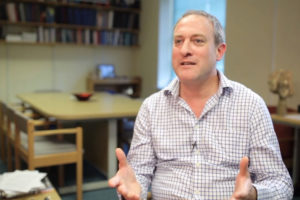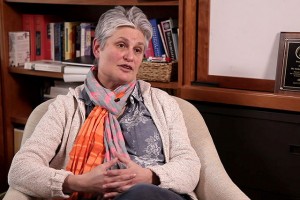Short-Term Memory
Neuroscientist Neil Burgess on the difference between short-term and long-term memory, phonological loop, and ...
A good place to start when talking about ageing is actually the meaning of the word ageing because it’s very confusing. It’s a word that has different meanings, and when people talk about ageing, they can mean different things. For example, ageing can refer to the passage of time, calendar ageing: you grow older just in terms of how many years you’ve been alive. But ageing can also sometimes refer to the changes that happen as you get older, any kind of changes, and those changes can be negative, but they can be neutral, or they can be beneficial. So you talk about maturational changes during adulthood: you mature, and that means you’re improving, so that’s an aspect of ageing which is positive.
According to the view of some, they would argue that if you’re studying ageing, if you’re trying to work on ageing and make use of the science of ageing, what you want to do is to allow people to age naturally and normally but remain free of the diseases of ageing. So there’s kind of the good ageing and the bad ageing. I think my understanding of that notion is really a pragmatic approach to aging which has been developed by doctors. If I go to my doctor, I’m in my late 50s and I say, look, I’m worried because my eyesight’s not so good, there’s something wrong with my eyes, and she’ll say, no no no, you’re in your late 50s, it’s just normal ageing of the eyes. Or if I say, my skin’s wrinkling, a bit worried, and she’ll say, no no no, that’s just the age, it’s just not normal ageing of your skin.
But from a biological perspective, from the point of view of biological processes there isn’t really any basis for this division between diseases of aging and kind of normal aging.
Here, we’re talking about senescence; we’re talking about all of the different aspects of senescence. I’m not talking about maturation, I’m talking about deterioration. The fact that my eyesight is failing is because of deterioration of my eyes, or if my skin is wrinkling, it doesn’t hurt; it’s not a disability or anything, but from a biological perspective, what’s happening here is the beginnings of essentially the degeneration of my skin. As I get older, it will become more and more severe, and my eyesight will get worse and worse.
So the division between kind of normal ageing, normal senescence if you like, and diseases of ageing actually, in scientific terms, has no real rationale behind it. In fact, this division between ageing and disease is something that is quite permeable. Over the years, increasingly, conditions that are part of ageing, which were once viewed as normal ageing, such as muscle wasting, sarcopenia or even Alzheimer’s disease, are now regarded as diseases. When I was a boy, Alzheimer’s disease only referred to the hereditary Alzheimer’s disease which you develop when you’re in your middle age, and the later dementia was called normal senility, so you wouldn’t say grandma’s got Alzheimer’s disease, you’d say grandma’s just a bit senile. That’s just nature taking its course.
From that point of view, this division between normal ageing and diseases of ageing has no rational basis, and in fact, all of it is essentially pathological. The whole process of senescence is a pathological process; it’s all kind of a disease state. Looking at it from that point of view, I don’t think scientifically it’s a controversial thing to say that senescence is fundamentally a disease process. When I think that my eyesight started to go and my skin started to wrinkle, these are just the beginning stages of a massive disease process that I’ll eventually die from.
So what’s sometimes stated that scientists working on the biology of aging should be doing, which is that they should be looking to treat aging-related diseases but not aging itself, really makes no sense whatsoever. All of it is bad, so intervening in any part of it is something that what we should be doing, ethically it’s the right thing to do, to treat the whole aging process.
And I think this false dichotomy between ageing and disease is something which is and has been a kind of an obstruction to investigating research on the biology of ageing. I’ll just give a kind of slightly silly example: at the moment the Medical Research Council which is one of the main funding agencies in the UK don’t really fund research on the basic biology of ageing because they say ageing is not a disease, whereas Biotechnology and Biological Sciences Research Council which is the main funding agency for biology will be reluctant to fund you if you say you’re interested in how ageing gives rise to ageing-related diseases because they say they don’t fund disease.
And similarly, the Age UK is the main charity for raising money for the elderly; it’s a very good charity. But when the charity formed from the merger of two smaller charities, they stopped funding research on the basic biology of ageing. My understanding is that that’s partly because they found the notion of viewing ageing as a disease as something rather unwholesome and even sort of discriminatory and somehow disrespectful to the elderly. So, I think this is something that has caused quite a lot of confusion.
So ageing, therefore, is really a disease syndrome; it’s really something which is the cause of most diseases worldwide. It’s therefore very important to really understand what is this process of senescence, why it happens, and what causes it, which makes it extraordinarily interesting to work on as a scientist. You’ve got what is really the cause of most of the diseases in the world now, and yet it’s really not understood; it’s remarkable. So, one of the reasons why it’s not well understood is because it’s a very, very complex process. It’s almost certainly something which is controlled by our own genome, and it’s sort of defeated really the tempts by scientists to understand it.
So really this is the goal of the research. The idea is that if you could solve ageing in this one simple organism, then you would be able to discover the basic principles that underlie ageing as a process. We’re really looking for very, very fundamental principles, similar in their level of generality to things like the germ theory of disease of Pasteur and Koch. There’s something that gives you a fundamental basic insight into the nature of ageing, so that’s really what this work is trying to achieve. So if we understand it in this simple organism, then I think that should open the way to really being able to understand where Alzheimer’s disease comes from, why when you get old, you get osteoarthritis, what happens to the lungs as you get older, why do you develop the chronic obstructive pulmonary disease, are there general principles that underlie how senescence, how ageing is giving rise to all of those diseases. And then, hopefully, through that one, we can find ways to prevent those illnesses from developing in the first place.
What’s exciting about working with the animal models is that you can actually intervene in ageing in these simple animals; you can actually manipulate the ageing process in such a way that you can speed it up or you can slow it down quite considerably. When you do that, you can slow down all of the funny diseases that the worms get as they get older and prevent them from developing, so the animals stay healthier for longer, and then they live longer. Somehow, in the worm, there have to be some big secrets about the nature of ageing. I and quite a lot of other labs around the world are all kinds of pursuing these secrets; they’re like a kind of Holy Grail for the biology of ageing, to have some fundamental knowledge of ageing, of what’s actually causing it.

Neuroscientist Neil Burgess on the difference between short-term and long-term memory, phonological loop, and ...

Neuroscientist Karl Friston on split personality, the nature of mental disorders, and the possibility of a the...

Biologist Catherine Dulac on triggers of social behavior, the genetic breakthrough, and pheromones